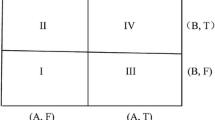Abstract
A theory of reverse triple I method with sustention degree is presented by using the implication operatorR 0 in every step of the fuzzy reasoning. Its computation formulas of supremum for fuzzy modus ponens and infimum for fuzzy modus tollens are given respectively. Moreover, through the generalization of this problem, the corresponding formulas of α-reverse triple I method with sustention degree are also obtained. In addition, the theory of reverse triple I method with restriction degree is proposed as well by using the operatorR 0, and the computation formulas of infimum for fuzzy modus ponens and supremum for fuzzy modus tollens are shown.
Similar content being viewed by others
References
Li Hongxing, Interpolation mechanism of fuzzy control, Science in China, Ser. E, 1998, 41 (3): 312–320.
Buckley, J. J., Sugeno type controllers are universal controllers, Fuzzy Sets and Systems, 1993, 53: 299–303.
Rovatti, R., Fuzzy piecewise multilinear and piecewise linear system as universal approximators in Sobolev norms, IEEE Trans on Fuzzy Systems, 1998, 6: 235–249.
Wang, L. X., Universal approximation by hierarchical fuzzy systems, Fuzzy Sets and Systems, 1998, 93: 223–230.
Ying, H., Sufficient conditions on general fuzzy systems as function approximators, Automatica, 1994, 30: 521–525.
Ying, H., Sufficient conditions on uniform approximation of multivariate functions by Takagi-Sugeno fuzzy systems with linear rule consequent, IEEE Trans on Systems, Man and Cybern, 1998, 28: 515–520.
Zeng, X. J., Singh, M. G., Approximation accuracy analysis of fuzzy systems as fuzzy approximators, IEEE Trans on Fuzzy Systems, 1996, 4: 44–63.
Chen, B. S., Tseng, C. S., Uang, H. J., Robustness design of nonlinear dynamical systems via fuzzy linear control, IEEE Trans. on Fuzzy Systems, 1999, 7: 571–585.
Wang Guojun, The full implicational triple I method for fuzzy reasoning, Science in China, Ser. E, 1999, 42 (1): 43.
Wang Guojun, On the logical foundation of fuzzy reasoning, Information Sciences, 1999, 117: 47–88.
Song Shiji, Theory of restriction degree of triple I method with total inference rules of fuzzy resoning, Progress in Natural Science, 2001, 11(1): 58–66.
Song Shiji, Reverse triple I method of restriction degree of fuzzy reasoning, Progress in Natural Science, 2002, 12 (5): 373–377.
Author information
Authors and Affiliations
Corresponding author
Rights and permissions
About this article
Cite this article
Song, S., Wu, C. Reverse triple I method of fuzzy reasoning. Sci China Ser F 45, 344–364 (2002). https://doi.org/10.1007/BF02714092
Received:
Issue Date:
DOI: https://doi.org/10.1007/BF02714092




